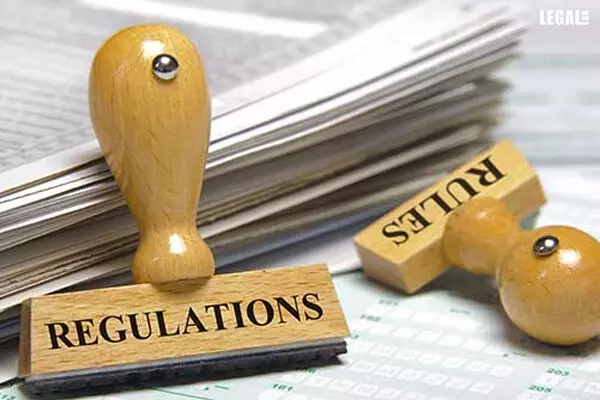- Home
- News
- Articles+
- Aerospace
- Artificial Intelligence
- Agriculture
- Alternate Dispute Resolution
- Arbitration & Mediation
- Banking and Finance
- Bankruptcy
- Book Review
- Bribery & Corruption
- Commercial Litigation
- Competition Law
- Conference Reports
- Consumer Products
- Contract
- Corporate Governance
- Corporate Law
- Covid-19
- Cryptocurrency
- Cybersecurity
- Data Protection
- Defence
- Digital Economy
- E-commerce
- Employment Law
- Energy and Natural Resources
- Entertainment and Sports Law
- Environmental Law
- Environmental, Social, and Governance
- Foreign Direct Investment
- Food and Beverage
- Gaming
- Health Care
- IBC Diaries
- In Focus
- Inclusion & Diversity
- Insurance Law
- Intellectual Property
- International Law
- IP & Tech Era
- Know the Law
- Labour Laws
- Law & Policy and Regulation
- Litigation
- Litigation Funding
- Manufacturing
- Mergers & Acquisitions
- NFTs
- Privacy
- Private Equity
- Project Finance
- Real Estate
- Risk and Compliance
- Student Corner
- Take On Board
- Tax
- Technology Media and Telecom
- Tributes
- Viewpoint
- Zoom In
- Law Firms
- In-House
- Rankings
- E-Magazine
- Legal Era TV
- Events
- Middle East
- Africa
- News
- Articles
- Aerospace
- Artificial Intelligence
- Agriculture
- Alternate Dispute Resolution
- Arbitration & Mediation
- Banking and Finance
- Bankruptcy
- Book Review
- Bribery & Corruption
- Commercial Litigation
- Competition Law
- Conference Reports
- Consumer Products
- Contract
- Corporate Governance
- Corporate Law
- Covid-19
- Cryptocurrency
- Cybersecurity
- Data Protection
- Defence
- Digital Economy
- E-commerce
- Employment Law
- Energy and Natural Resources
- Entertainment and Sports Law
- Environmental Law
- Environmental, Social, and Governance
- Foreign Direct Investment
- Food and Beverage
- Gaming
- Health Care
- IBC Diaries
- In Focus
- Inclusion & Diversity
- Insurance Law
- Intellectual Property
- International Law
- IP & Tech Era
- Know the Law
- Labour Laws
- Law & Policy and Regulation
- Litigation
- Litigation Funding
- Manufacturing
- Mergers & Acquisitions
- NFTs
- Privacy
- Private Equity
- Project Finance
- Real Estate
- Risk and Compliance
- Student Corner
- Take On Board
- Tax
- Technology Media and Telecom
- Tributes
- Viewpoint
- Zoom In
- Law Firms
- In-House
- Rankings
- E-Magazine
- Legal Era TV
- Events
- Middle East
- Africa
CCI Releases New Draft Regulations On Predatory Pricing

CCI Releases New Draft Regulations On Predatory Pricing
Asks stakeholders to comment by 19 March
The Competition Commission of India (CCI) has released the draft CCI (Determination of Cost of Production) Regulations, 2025, to determine the cost of production and update its framework for assessing predatory pricing. This will replace the existing norms set in 2009.
Under the Competition Act, 2002, Section 4(2)(a)(ii) prohibits predatory pricing as an abusive conduct by a dominant enterprise.
The ‘predatory price’ is the sale of goods or provision of services at a price below the cost, intending to reduce competition or eliminate competitors.
The draft, issued under Section 64(2)(a), empowers the regulator to prescribe cost benchmarks for assessing anti-competitive practices.
The CCI’s consultation paper stated that the cost would be taken as the average variable, serving as a proxy for marginal cost in predatory pricing assessments.
However, in specific cases, the Commission could consider other measures such as average total cost, average avoidable cost, or long-run average incremental cost.
The move follows amendments to the Competition Act in 2023, which necessitated revisions to several regulations, aligning with evolving legal and economic standards. The Commission observed that the regulations aligned with modern economic theories, judicial interpretations, and international competition law practices.
Under the proposed norms, while determining the costs, the CCI or the director-general could seek assistance from experts and enterprises disputing the cost determination. They could request an independent expert to review it at their own expense.
The draft also provides confidentiality requests regarding the submitted documents. However, it would be assessed in line with the Competition Commission of India (General) Regulations, 2025.
While the earlier cost regulations would be repealed, any action, decision, or ongoing inquiry would remain valid.



